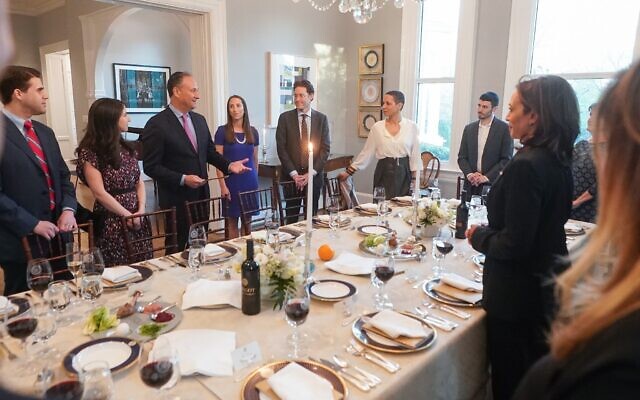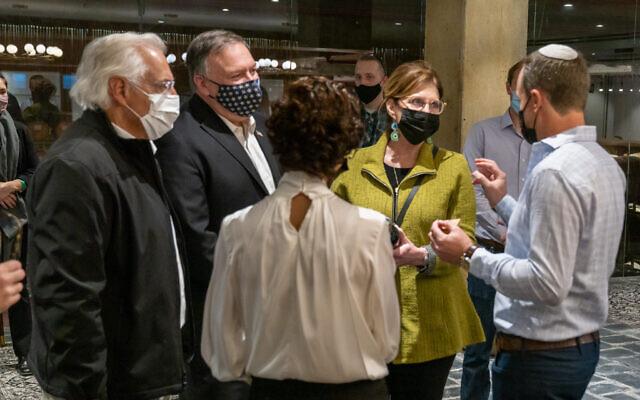PAKISTAN
ENSURING PROTECTION WITH DIGNITY
Madeeha SyedPublished April 17, 2022 -

Nayyab Ali, the Tahaffuz desk’s Victim Support Officer (centre),
with members of the transgender community
| Courtesy Islamabad Police
LONG READ
After the success of a Gender Protection Unit, focusing on gender violence, harassment, and domestic and child abuse cases, Islamabad Police has launched a Tahaffuz desk to provide support to the transgender community. Who are the individuals behind the ambitious initiative? And what kind of a difference do they hope to make?
Atall, striking transgender woman enters the Gender Protection Unit (GPU) at the Police Facilitation Centre in Islamabad’s sector F-6. She’s here to have a matter resolved at the recently launched Tahaffuz desk — a desk focusing on the needs of the transgender community.
It’s already past 8pm, so the desk is operating with its ‘skeleton staff’ — a couple of female police officers, a few other staff members and Nayyab Ali, a transgender woman and the desk’s victim support officer (VSO).
Fresh faced and without any make-up on, the complainant, Zara*, tells one of the police officers that she’s being threatened and harassed by another transgender person.
“She’s accusing me of spreading rumours about her,” says Zara, referring to another trans woman, Bano*. “That I’m telling people she doesn’t make enough money and that her clothes are cheap. Why would I even do that? She’s ugly. She’s clearly jealous of me and wants to harm me.”
The young police officer asks Zara questions and gets more details.
Apparently, after a heated exchange between Zara and Bano, Bano forcibly broke into Zara’s home and threatened to kill her. Zara says she has witnesses and wants to file a formal report.
The police officer asks Zara to write all of this down. “I do not know how to write,” Zara says sheepishly. The police officer then asks her to narrate the statement and jots it down.
At this point there is some commotion behind them and a group of three transgender women come barging in. “What are you doing here?” says Bano, apparently shocked to see Zara at the police station. “Did you take my name?” a friend of Bano’s asks.
“She was with her,” Zara says, pointing to the friend. “They tried breaking my door down while threatening to kill me!”
The situation keeps escalating and the already raised voices keep getting louder.
“I only asked her to stop spreading rumours about me or I could kill her,” Bano tells the police officer, who is not amused. “Are you threatening someone inside a police station?” the policewoman asks sternly.
“No ma’am, you don’t understand,” Bano says. “This is just how we talk.”
Emotions are running very high. At this point, Nayyab turns up behind the group. Her presence seems to calm everyone down. She escorts the trans women into her office next door, sits on her desk and turns her computer on.
It’s now her turn to question both parties and determine whether the threats carry any merit leading to an FIR or if this is a dispute that can be resolved amicably.
Yet another group of trans women, who Bano’s friends had called as ‘back-up’, arrive in the waiting area. But everyone feels comfortable knowing that their friends are talking to one of their own. Someone who understands them. Someone who knows their struggle.
Clearly this is the power of this desk. It is another valuable addition to the Police Facilitation Centre after the GPU, a project that has already received high praise and has been lauded as a success story.
A POLICE STATION LIKE NO OTHER

Nayyab at a rally for transgender rights
The Police Facilitation Centre in F-6, which houses the GPU and the Tahaffuz desk, doesn’t feel like a traditional police station — it looks more like a bank. Police officers are seated behind desks with computers and visitors get token numbers for their turn to speak with them. This centre is clearly designed to be an accessible, unintimidating place for the police to help you.
“The purpose of making the Tahaffuz desk is so that transgender citizens — who are the most vulnerable segment of society, the most neglected segment of the society — can access police help without any prejudice and without any harassment,” says ASP Beenish Fatima, speaking with an air of authority.
As Beenish walks me through the building, officers in the vicinity — mostly men — stand for her in respect.
Beenish, who topped the elite police training course, jokes that she is one of the few from the newer generation of women police officers that chose to enter the police force ‘shauq se’ (out of their own will), and not because it was a family tradition. She is also one of the rare few women at the senior officer level in Pakistan — generally, women make up less than two percent of police officers.
The purpose of making the Tahaffuz desk is so that transgender citizens — who are the most vulnerable segment of society, the most neglected segment of the society — can access police help without any prejudice and without any harassment,” says ASP Beenish Fatima, speaking with an air of authority.
Some of the most sensitive areas of the capital have come under her jurisdiction — up until a few weeks ago, when she was sub-divisional police officer (SDPO) Kohsar (she is currently SDPO Sihala), the Parliament and the Prime Minister House were only a few kilometres away.
She is on call 24/7 and often, after a long day at work, manages to make only a short trip home before returning for her turn to do night patrol. On some days she gets home after patrolling so late that she gets only a couple of few hours of sleep before she heads on over to the GPU, a stone’s throw away from her thana, to check in on her pet project — the transgender facilitation desk or Tahaffuz.
The Tahaffuz desk in Islamabad isn’t the first one that Beenish has opened. She had started a similar desk a couple of years ago in Rawalpindi. It was a roaring success in a neighbourhood that needed it the most.
PROTECTION FOR TRANS SISTERS

ASP Beenish Fatima | Courtesy Beenish Fatima
It was soon after Beenish was posted in Civil Lines, Rawalpindi, sometime in 2018, that she noticed something. “Almost every night we would get a 15 [the official police helpline] call with different issues specifically related to transgender persons,” she says. “It was a bunch of things: cash stolen from a transgender person, transgender persons were begging somewhere and were touched or groped inappropriately, there were incidents of violence, getting beaten up or stabbed. For us to get calls like these became a part of our routine.”
Under the jurisdiction of Police Station Civil Lines was the area of Jhanda Chichi, which incidentally also happens to be home to a large number of the transgender community. “You would’ve heard, there’s a very famous transgender activist, Almas Bobby — she lives there,” says Beenish. “She’s given shelter to many transgender women.”
Almas Bobby is one of the most well-known transgender persons in Pakistan. A former television host, she is also the head of the Pakistan Shemale Foundation.
Beenish’s boss at the time (and even now, as he is the current Inspector General of the Islamabad Police) Muhammad Ahsan Younas demanded to know what was the status of the registration of FIRs in response to all of the complaints they were getting via their helpline.
“I told him it doesn’t happen,” says Beenish. “They just don’t come to the station. And when they do, they say that their aggressor will hold a grudge against them. So, they don’t register a case against them.”
These conversations led to the Tahaffuz desks. Beenish credits Younas as the person behind both the Tahaffuz desks in Rawalpindi and Islamabad.
Police stations aren’t always the most welcoming of places, especially for those living on the fringes of society. Beenish reaffirms this. “When they do finally come, police officers will make fun of them,” she says. “They’ll judge them for going out late at night to [perform] music or dance.”
Beenish pauses. “Yes, they went to dance,” she says, “but they did not go to get stabbed.”
“They didn’t go to get knifed and be sent home. You cannot justify violence in any way. On anyone,” she stresses.
ENGAGING COMMUNITY LEADERS

Trans women line up to speak to Nayyab at the Tahaffuz desk | Islamabad Police
While the police officers at the Tahaffuz desk in Islamabad make sure it runs smoothly, the face of the initiative for the transgender community is Nayyab Ali. The victim support officer (VSO) for the desk is also seen as a leader in the transgender community. She is clearly someone who is determined to do things differently.
When Nayyab speaks to me with a dupatta and her face covered with a mask, I can see how calm her presence is. While she speaks softly and politely, she doesn’t mince her words.
“The biggest challenge the community had was with the police,” she says, firmly. “As Beenish was saying: transgenders se paisay chheen liye [They snatched money from transgender persons]. But who was snatching that money? It was the police officers who would be patrolling at night. They would stop transgender persons returning home after a wedding function and bully them out of it. They felt they could do it and get away with it. For this reason, there has been a very bad image of the police, obviously.”
While the police officers at the Tahaffuz desk in Islamabad make sure it runs smoothly, the face of the initiative for the transgender community is Nayyab Ali. The victim support officer (VSO) for the desk is also seen as a leader in the transgender community. She is clearly someone who is determined to do things differently.
She points to the bouquets of flowers on her desk. “I’ve received flowers yesterday and today because they’re [transgender persons] so happy they don’t have to go to a [traditional] thana. They can directly come where a person from their community will receive them.”
This isn’t the first time Nayyab has worked with the police to get justice for her community. The recipient of human rights awards from around the world, including the Franco-German Prize for Human Rights, she’s worked with various local and international organisations on gender-based violence.
Nayyab is also particularly proud of the fact that she was from the group that helped draft the Transgender Protection Act (2018), a landmark law that recognised and gave rights to the transgender community.
Nayyab’s life has been challenging. The odds have always been stacked against her, but she has continued to fight for herself and her community. It has all led her here — to a position where she can make meaningful change in the lives of the members of her community.
NAYYAB’S JOURNEY

A campaign poster from when Nayyab contested for a seat from Okara in 2018
“You know a lot of horrible things happen to the transgender community. It happened to me too. My family abandoned and disowned me,” she tells me. But she kept her mother’s words — ‘once you are educated, you will be powerful’ — close to her heart, she says. Despite all the harassment and discrimination she faced growing up, Nayyab continued her education and graduated in International Relations and did her post-graduation in Women and Gender Studies.
“But I had such horrible experiences that I didn’t want to become a member of mainstream society,” she says. So she left and joined the household of a transgender guru. It’s there that an incident happened that changed her life forever.
“I was living with a guru, the elder of the house, sometime in 2016, when a transgender person came to her,” relates Nayyab. “She was the victim of rape — a violent gang rape. She was crying and saying she wanted to report her case. My guru’s exact words were: ‘This is part of our life. We cannot report it because we have to spend our life with people like them.’
“In the last three years, there have been 78 murders of members of the transgender community in Pakistan and not a single person was held accountable for it,” she puts a hand on her chest and takes a moment to take a few deep breaths. The impact of this statement rests very heavily on her.
There was no way Nayyab was going to let the perpetrators of the rape go. The victim also felt that Nayyab, being one of the rare few from the community who was educated, was the only one who could help her. “I went and got the FIR registered,” she says. “We had a strong case. There was DNA evidence. It was clear who were the people that had raped her. It was proven.”
Predictably, Nayyab began receiving threats. But she was undeterred. “I had been getting threats before as well, as my profession [at the time] was also singing and dancing,” she says.
Despite the strong evidence, however, the case went nowhere. “My guru forced an out-of-court settlement of the case and that’s when I started getting serious threats,” she says.
These weren’t just empty threats. “As a result of the threats, I was a victim of an acid attack,” she tells me.
Nayyab knows the road to change is not an easy one, especially for trans persons. She experienced this firsth and when she ran for elections from her hometown in Okara in 2018. Her opponents were shocked that a ‘khusra’ [a derogatory term for a transgender person] was standing against them. Voters would ask, ‘Oh now we’re supposed to vote for khwaja sirahs as our leaders?’
The statement takes me by surprise. At this point I have been interacting with Nayyab for a couple of days and haven’t noticed anything. She removes her face mask and sweeps aside her dupatta to show me heavy scarring on the lower half of her face, chin and neck.
“This is our great tragedy,” she says. “In a lot of cases there is wrong investigation. In a lot of cases, biological relatives, who have previously rejected their child, take money from the murderer and ‘forgive’ them. Justice is rare for transgender persons.”
While Nayyab’s emotional scars took years to heal, her physical recovery took up to three months. “I kept thinking, ‘I’m still alive’,” she says. “Even after everything that had just happened. I remembered everything — my parents kicking me out of the house, being abused by society, the discrimination, the violence and the threats, and this attack. But despite all of it, I’m still here.”
All this led Nayyab to think that there must be some purpose to her life. She promised herself that she had to do something for the betterment of her community.
“From then to now, there is a list of achievements,” she says chuckling.
MOVING PAST COLLECTIVE TRAUMA
The lack of education, and the lack of acceptance into homes, schools and workplaces from a very young age, often forces transgender persons, even the seemingly educated and qualified ones, to perform at weddings and the births of children. Many also have to resort to sex work.
I’ve met transgender persons at the Shahi Mohalla in Lahore who’ve shown me their qualifications while relating that no one will hire them because of their appearance alone. And that they are forced into sex work, putting their lives and bodies at risk.
“The community has ‘adjusted’ and learned how to live with violence,” says Nayyab.
“It’s developed a reputation among the common man that that the majority of transgenders are ‘habitual’ sex workers,” says Nayyab.
Nayyab asks rhetorically that when a transgender child is abandoned by her family, or when a family sends her to a guru who doesn’t know any way of life other than begging, prostitution and dancing, what will she teach that child?
“How many times do you think has that child been raped?” she asks. “How many times has a sexual offence been committed with that child that is not reported?”
Nayyab says that, growing up, trans children learn that all these heinous acts are a part of life. “Do they even understand what violence is?” she questions, adding that acceptance of violence extends to cis women as well. This violence is exactly why initiatives such as the GPU and the Tahaffuz desk are so necessary.
While conducting research in Khyber Pakhtunkhwa, Nayyab asked a woman if her husband had ever hit her. The woman said: “Yes, but that’s how men show their love, too. They hit you because they love you.”
This acceptance of violence filters down to the transgender community — from one oppressed to the other. “In our community, there is a famous saying in Punjabi, ‘mashookaan pichhay kukkaan’ [Lovers always catcall]. Basically, if someone is after you, giving threats, saying things like ‘if you come to my area we’ll cut your hair, we’ll rape you…’ they say this is something to be proud of. People are giving threats because you are important.”
Even if things were to somehow, miraculously, become perfectly alright now, it will probably take time for the community to work through and move past the collective trauma they have suffered and accepted for generations.
STRIVING FOR CHANGE
Nayyab believes that things are slowly changing, however.
“The bill of rights for the transgender community was created in consultation with the community,” says Nayyab. “When it was done, we would tell the community that your bill of rights is coming. I remember this comment that was said to me by a leader in the community. She said, ‘Achha? [Really?] I don’t know what bill you’re talking about. But we pay our electricity and gas bill every month!’
“Look at that innocent response,” chuckles Nayyab. “It’s also reflective of how deprived and far removed from all of these things they are. They didn’t know they had rights.”
But, now they do.
Nayyab knows the road to change is not an easy one, especially for trans persons. She experienced this firsthand when she ran for elections from her hometown in Okara in 2018. Her opponents were shocked that a ‘khusra’ [a derogatory term for a transgender person] was standing against them. Voters would ask, ‘Oh now we’re supposed to vote for khwaja sirahs as our leaders?’
Still she powered through, securing 1,200 votes. “It was all very new for them [the people of Okara],” she says, adding that she believes this opened their minds a bit.
In her new position, Nayyab is directly fighting the violence against her community. Seeing the young 30-year-old VSO speak to distressed members of her community, reassuring them and helping them find solutions, one hopes to see similar desks set up across the country.
PREVENTION IS BETTER THAN CURE
As a law-enforcement officer, Beenish believes that the most important thing is preventing a crime from happening. “The most important thing about this desk is that it gives a sense of security to the community,” says Beenish. “And [creates] a sense of fear among the aggressors because now they know that reporting is available. That fear is very important.
“When a crime has already been committed, your major loss is done,” she says. “If a child has been molested, for example, even if we’ve caught the perpetrator, and he went to jail, was sentenced etc., all of that doesn’t undo the trauma that has already been inflicted on that child.
“And so the key is prevention,” she says. “People don’t focus enough on that. You have to stop a transgender person from being molested. You have to prevent a child from being sodomised. You have to ensure that violence against women doesn’t take place.”
Beenish firmly believes that initiatives like the GPU and the Tahaffuz desk will act as deterrents as they provide vulnerable segments of the society access to police help.
She shares an incident during which the police investigated a crime against a transgender person, even when the victim declined to pursue the case. “The Tahaffuz desk in Rawalpindi was instrumental in this case,” she says.
Some time in 2020, a couple of transgender persons were performing at a wedding. Later they were forced to strip at gunpoint. “They didn’t report it but a mobile phone video clip from that incident went viral,” says Beenish.
The victims were unwilling to come forward and pursue the case. They feared repercussions by the perpetrator and a loss of the only meagre income they had if word got out that they were ‘trouble’. All very real concerns.
So the police became a complainant in the case and registered an FIR under its own cognisance, Beenish says. “The victim was never a party to the case.”
The police traced the source of the video to Kala Saeeda in Rawalpindi, found the perpetrators and arrested them.
For Nayyab too, the Tahaffuz desk is a major step forward in bringing justice to the transgender community and having their voices heard. But there is still a lot that still needs to be done, she says.
“The Transgender Act… I am relating to it again and again because it is the endorsement of fundamental rights of being a citizen of Pakistan,” she says. “But as transgender persons, even now, we’re struggling for fundamental rights.”
“We need inclusion, space, mainstreaming, basic rights and services, equality, and non-refusal of services, which happens normally.
“A very good thing that happened in hospitals is [the inclusion of] Sarah Gill [the first transgender doctor in Pakistan]. That’s a very good example of inclusion,” Nayyab says. “Acceptance is here, but now we need inclusion. Inclusion with dignity.”
Explaining the difference, Nayyab says that acceptance to her is people saying ‘Okay, these people are living with us in our mohallas, colonies and offices.’ “Inclusion for me,” says Nayyab, “is just being able to have a cup of tea together.”
*Name has been changed to protect identity
The writer is a member of staff. She tweets @madeehasyed
Published in Dawn, EOS, April 17th, 2022



.jpg)





















